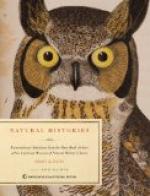It usually happens when the male of any species is killed during the breeding season, that the female soon procures another mate. There are, most likely, always a few unmated birds of both sexes, within a given range, and through these the broken links may be restored. Audubon or Wilson, I forgot which, tells a pair of fish-hawks, or ospreys, that built their nest in an ancient oak. The male was so zealous in the defence of the young that it actually attacked with beak and claw a person who attempted to climb into his nest, putting his face and eyes in great jeopardy. Arming himself with a heavy club, the climber felled the gallant bird to the ground and killed him. In the course of a few days, the female had procured another mate. But naturally enough the step-father showed none of the spirit and pluck in defence of the brood that had been displayed by the original parent. When danger was nigh, he was seen afar off, sailing around in placid unconcern.
It is generally known that when either the wild turkey or domestic turkey begins to lay, and afterwards to sit and rear the brood, she secludes herself from the male, who then, very sensibly, herds with others of his sex, and betakes himself to haunts of his own till male and female, old and young, meet again on common ground, late in the fall. But rob the sitting bird of her eggs, or destroy her tender young, and she immediately sets out in quest of a male, who is no laggard when he hears her call. The same is true of ducks and other aquatic fowls. The propagating instinct is strong, and surmounts all ordinary difficulties. No doubt the widowhood I had caused in the case of the woodpeckers was of short duration, and chance brought, or the widow drummed up, some forlorn male, who was not dismayed by the prospect of having a large family of half grown birds on his hands at the outset.
I have seen a fine cock robin paying assiduous addresses to a female bird as late as the middle of July; and I have no doubt that his intentions were honorable. I watched the pair for half an hour. The hen, I took it, was in the market for the second time that season; but the cock, from his bright, unfaded plumage, looked like a new arrival. The hen resented every advance of the male. In vain he strutted around her and displayed his fine feathers; every now and then she would make at him in a most spiteful manner. He followed her to the ground, poured into her ear a fine, half-suppressed warble, offered her a worm, flew back to the tree again with a great spread of plumage, hopped around her on the branches, chirruped, chattered, flew gallantly at an intruder, and was back in an instant at her side. No use,—she cut him short at every turn.
The denouement I cannot relate, as the artful bird, followed by her ardent suitor, soon flew away beyond my sight. It may not be rash to conclude, however that she held out no longer than was prudent.




